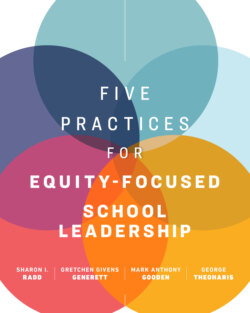Читать книгу Five Practices for Equity-Focused School Leadership - Sharon I. Radd - Страница 27
На сайте Литреса книга снята с продажи.
"I don't need this. It isn't relevant to me."
ОглавлениеToo often, school structures and enrollment patterns inhibit authentic inclusion, allowing educators (leaders and teachers) to feel that students with marginalized identities are not their immediate responsibility. We hear this story often in suburban or rural schools with little or no racial diversity among students. We also hear this story from those who do not work directly with students with disabilities or ELs. Educators tell this story as a way to justify why they don't engage in equity-oriented work. This story positions equity as someone else's work and limits it to specific spaces.
Terry Town is a suburban school district that performs well on state measures. Terry Town prides itself on its community support and being a district that is more diverse ethnically and racially than its neighboring suburban districts. Still, during professional learning discussions, teachers and administrators often say things like, "I am all for equity, but it is not relevant in our district. Our community expects excellence."
Through their regional professional learning consortium, the Terry Town administrative team was asked to complete an equity audit (for more on equity audits, see Practice IV) and responded with dismissive eye rolling, stating "data are important but equity is just not the most pressing issue in our district." They proceeded, however, and were dismayed by the results. Although 6 percent of their students are Black, a startling 35 percent of discipline referrals and suspension were for Black students. While the district matched the national average of students receiving special education, students living in poverty were twice as likely as others to be placed in special education classrooms.
There are many dedicated educators in every district, but every school has work to do around issues of equity. Some issues may be more pressing than others at a particular time. But just like individuals must always keep learning, organizations and systems must always keep working to improve their equity efforts and outcomes across all groups and identities.
